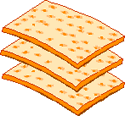|
|
|




|
Unleavened Bread
|
|
Jewish Calendar |
Nisan 15 - Nisan 21 |
|
Gregorian Calendar |
March/April |
|
Spring or Fall |
Spring Feast |
|
Scripture |
Leviticus 23:6
Deuteronomy 16:8 |
|
Significance |
Unleavened Bread speaks of sanctification. Jesus was set apart. His body would not
decay in the grave. |
The following day, on the fifteenth of the Hebrew month of Nisan, God appointed
another festival. This feast would last seven days and be
called the Feast of Unleavened Bread. On the first night, and again on the seventh,
there was to be a time of convocation (meeting) between God and man.
The Feast of Unleavened Bread (Exodus 23:15; Deuteronomy 16:16) is often
called Passover because only unleavened bread was eaten during these seven days
immediately following Passover (Exodus 12:15-20; 13:6-8; Deuteronomy 16:3-8).
Unleavened bread reflected the fact that the Israelites had no time
to put leaven in their bread before their hasty departure from Egypt; it
was also apparently connected to the barley harvest (Leviticus 23:4-14).
A common Jewish tradition in preparing for the Feast of Unleavened Bread is to
sprinkle leavened (yeast) bread crumbs throughout the house and then subsequently
sweep them all up and collectively burn them outside. You might be asking yourself,
Why would they do this? Well, in the Bible, leaven symbolizes error or evil. It is
the substance that causes fermentation. The Lord said to His disciples "Beware of the
leaven (false doctrine) of the Pharisees" (Matthew 16:6; Mark 8:15). In addition,
the apostle Paul warned the Church at Corinth that "a little leaven (yeast) leaveneth
(ferments) the whole lump" (I Corinthians 5:6). Paul was simply saying that if sin
goes unchecked, it will permeate and infect everything and everyone around them.
The Lord Christ Jesus was crucified on the cross at Golgotha
on the day of Passover. He was then buried in a newly hewn tomb donated by Joseph
of Arimathea. However, unlike all other corpses, the body of Jesus (Yeshua) would
not decay in the grave. There would be no decomposition of His body, no, none indeed.
God the Father would not "allow thine Holy One (His Son Jesus) to see corruption (Psalm 16:10; Acts 2:27).
The Feast of Unleavened Bread proclaims that Christ's physical body would not experience the ravages of death while in the grave; for He was sanctified (set apart) by God the Father.
|
|



 Back to the "Christ-Centered Mall" Back to the "Christ-Centered Mall"

This teaching was written by David Holt Boshart, Jr.
All scans done by Christ-Centered Mall, Inc. are prohibited from being copied.
All applicable copyright© laws apply and are reserved by Christ-Centered Mall.
Web pages copyright© 1998-2006. |
|

 Back to the "Christ-Centered Mall"
Back to the "Christ-Centered Mall"